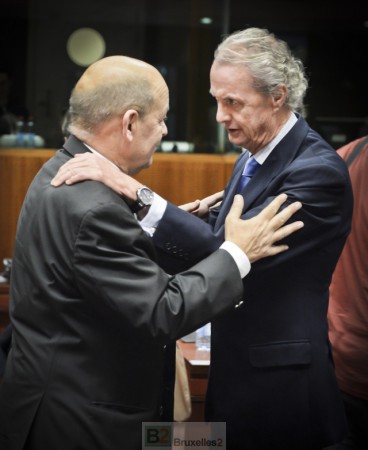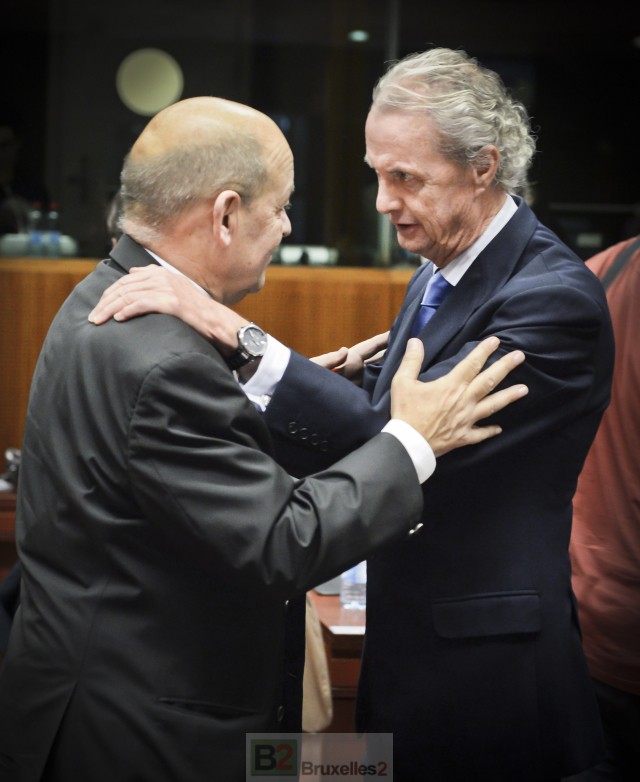The French demand for solidarity: a semi-flop

(B2) During the meeting of Defense Ministers, the Frenchman Jean-Yves Le Drian, should still ask his European allies for a little help and European assistance. It must be said that two and a half months after France invoked Article 42.7 (the mutual assistance clause), the Europeans are no longer really jostling at the French gate. Our first survey, after a month, showed a certain commitment, to be confirmed. Six weeks later, it cannot be said that there have been any major confirmation movements. And our judgment of 'rather positive' was refined to be 'rather negative' (if we were in a rating agency, we would say B-). Because no notable promise has been made since. Of course, one could say that Europeans are cautious, timid, pusillanimous. But, it seems, the responsibility for this flop is widely shared.
The needs of the border crisis
First of all, Europeans have needs elsewhere. On the one hand, the refugee and border crisis requires the mobilization of significant forces. And she doesn't seem ready to stop immediately. The army is called to the rescue in several countries (Germany, Austria, Croatia, Hungary, Greece). And states are more than reluctant to send their troops offshore.
Competition from American demand
On the other hand, we must also meet the American demand. Washington also sent out their catalog of requests to ask Europeans to get more involved in Iraq and Syria, in the fight against Daesh. A detailed request, accompanied by a ringing and stumbling argument: We are more committed on the European continent, in the countries close to Russia, you are more committed. The American request had the advantage of being incisive and clear. Between supporting the Americans and the French, several countries quickly made their choice. Officially, several of these countries (Italy, the Netherlands) have shown that they are responding to the French request in this way. A completely diplomatic courtesy which should not hide the fact that it was American pressure which above all paid for an additional commitment to the "Levant" (Iraq, Syria).
A rather vague French request
The French request was based on an argument of means: help us in Africa or the Middle East, to release means allowing us to use them on terrorism. A very beautiful allegory. But an argument very difficult to justify for example for the Central African Republic (moreover the supply in number of personnel amounts to less than ten all together for this country). Moreover, France has not asked for any direct means of combating terrorism in France; Which would have had a much more symbolic and real value of solidarity. The complication this would have caused, in terms of day-to-day management, weighed. But also a certain feeling, very national, that France can respond, on its own, to terrorism. To this must be added a fairly widespread feeling that managing an operation as a multinational offers a negative cost-benefit ratio. The French message was thus scrambled.
Multilateral (almost) always preferred to bilateral
Finally, the chosen method — "bilateralism" — also raises questions. When you call yourself "the United States," it can work. And again... Even Washington went through a "multilateral" channel: NATO. When one is called "France", which remains a medium-sized country, without powerful financial and material means, this is more delicate. Paris preferred to leave the European institution outside of any channel of coordination and consultation. To the great satisfaction of certain European officials who were thus able to wash their hands of any flop. However, this was forgetting a principle: apart from the United Kingdom (and a few others), the majority of countries do not really wish to engage in a bilateral "adventure", and prefer multilateralism - whether within the NATO, the UN or the European Union — which provides it with a security umbrella and provides it with political support internally. It can thus be noted that, apart from British assistance, all the commitments announced are either in a mission of the European Union or of the UN. A sign...
A tactical mistake
The use of Article 42.7 was a smart find. Having confined it to a bilateral negotiation has confused the issue. The European institutions have lost interest in it. Several countries were wary or took advantage to negotiate counterparties (still under discussion for Poland for example). National military officials were reluctant to engage, preferring to continue their planning. No external pressure really showing up, the European effort remained in the middle of the ford. In fact, Paris has only obtained two major commitments: the United Kingdom and Germany, both of which are part of a strategy that is as much national as bilateral, as well as a few crumbs of commitment in various European missions. Even the Belgians - who had reserved half a battalion at the disposal of the French in the Sahel - seem to be reconsidering their position. No agreement has been reached between Brussels and Paris. A flop that is as French as it is European.
Encouraging signs
Of course, in Paris, we reject this term. And we prefer to see the glass half full than the glass half empty. In the entourage of the Minister, whom B2 joined, we prefer to detect in the various announcements made by the Member States: “ encouraging signs ". And we salute the courageous decisions of partner countries ". However, the reality we perceived seems quite different. Until proven otherwise, the tour of the capitals carried out by B2 (read: The mutual assistance clause (42.7) activated. Who is mobilizing? How? 'Or' What ? (caps5)) demonstrates that there has been little major change since the end of December. An analysis based on quantified commitments, with supporting evidence, and not on impressions. For many countries, the reason for an external commitment cannot be reduced to solidarity with France. He can motivate it, justify it. It is in fact an argument (1), among others, but not the most decisive.
(Nicolas Gros-Verheyde)
(1) In particular, it makes it possible to justify certain external commitments, also making it possible to convince reluctant parliamentarians (especially if they belong to the social-democratic party).

